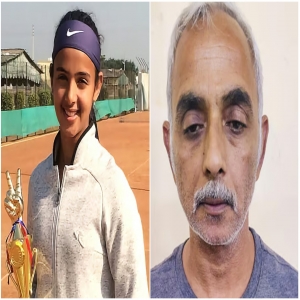
.jpg)
Radhika Yadav, a state-level tennis player and an independent, empowered young female, was brutally murdered by her father. Social media and news channels are covering the minute details and probable aim of this murder case. Many theories are emerging, such as her father was furious because she was creating reels or for being independent. Her father's initial confession revealed that people used to taunt him for living on his daughter's income.
The father shot Radhika dead with his licensed revolver while she was cooking in the kitchen. Initial investigations revealed that she was running a tennis academy, and his father was upset by taunts from the community members of his native village. The humiliation of living on his daughter's income triggered him. Another theory indicates that tensions between Radhika Yadav and her father escalated following an argument over a social media post.
Rather than simply reporting this event, it is crucial to engage in a dialogue about the underlying motives rooted in personal and social dynamics.
The Idea of Love Policed by Social Norms
A father, regarded as the embodiment of love and sacrifice, killed his daughter. When we witness such incidents, it shakes our beliefs in the existence of true love. Sociologically, based on various theoretical perspectives, one can sum up that the killing of a daughter for the sake of pride and ego is not merely a personal flaw but is shaped and reinforced by societal norms. Individuals, especially within patriarchal setups, often internalise these norms and values to such an extent that any perceived slight or deviation can lead to extreme reactions.
Philosophical Standpoint
From a philosophical standpoint, regardless of the reason behind this act, it is pertinent to reflect on the idea of love. It's difficult to digest a father killing his daughter, a wife killing her husband, a son killing his mother for so-called honour, pride and deep-rooted patriarchy. What's wrong with our connotation of love? Love is understood to be unconditional, pure and selfless. Nowadays, insecurity, ego, and pride are its prime features. Indeed, human beings are peculiar creatures, and our concept of love often comes with numerous conditions. Due to the patriarchal structure, for women, the concept of love comes with a condition plus model of family honour - beti ghar ki izzat (daughter is the dignity of the home).
It does not mean that love does not exist; we have abundant examples of unconditional love. A taxi driver, Bijender Shah, worked 12-16 hours a day to support his elder daughter's studies, who aspired to become an IAS officer (Hindustan Times, October 12, 2023). The famous coach Mahavir Phogat trained his daughters, breaking stereotypes related to women's wrestling. An Odisha retiree couple supported their son's marriage to a Marathi woman. However, they supported him while facing exclusion from their Agharia Samaj (Times of India, November 18, 2024) —likewise, challenging social norms, a transgender, Navya Singh, supported by her mother. Navya became the first trans-woman to walk at Lakme Fashion Week (Times of India, September 24, 2024). These real-life stories reflect that love is not steered by societal norms but by our actions, even at the cost of society's so-called honour.
An Appeal
To all parents, please understand that the true essence of parenting and love, as exemplified by the animal kingdom, is unconditional and without strings or preconditions attached. Unfortunately, human love often comes with prerequisites, such as preserving family pride and the responsibility of children to care for them in old age. Sadly, it is solely a human concern. A young, talented girl had her life taken away due to her father's shallow pride. Remember, children are not your property; they have the right to live their own lives. As a parent, it's your responsibility to guide them, not dictate their life based on your preconceived notions of right and wrong.